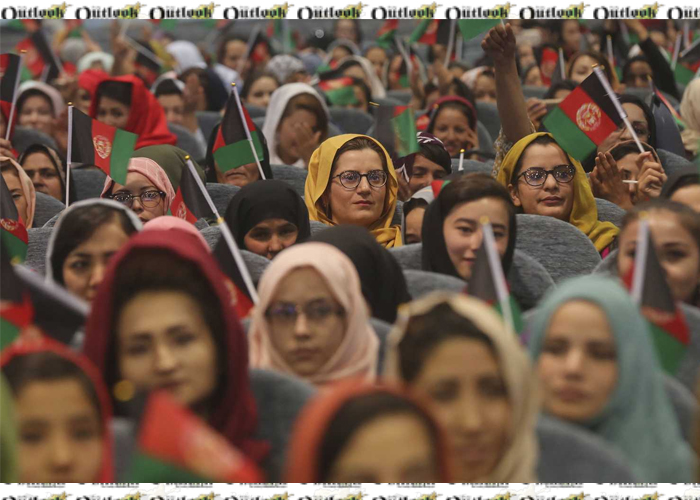Afghan women suffered severely as a result of cultural restrictions and social traditions. They were left at the mercy of discriminations on the grounds of their sex and deemed an inferior creature. Women underwent mental and physical tortures and fell victim to “honor killings”. They were obliged to live within the four walls, mother their children and satiate the carnal desires of their husbands. A woman who denied the subjugation of her husband was called “brazen” – a view holds sway in villages.
The culture of “Pashtunwalai” which ruled the Pashtun dominated areas for years still prevails in the villages. Based on this culture, women were chained within parochial mindsets and their human rights were trampled upon. Pashtunwalai is a tribal council in which tribal elders play the role of the state and judges. The words of tribal elders were preferred not only to the state law but also to religious sharia. For instance, the desert court and flagellating or stoning women were finalized by tribal elders without regard to the country’s law. In short, a strong patriarchal system, in which radical worldview is deeply embedded, ruled the villages and lingers up to now. In Pashtunwalai tradition, radical mentalities and personal narration of religious texts, regarding women, were imposed on religious sharia and implanted in the areas.
The culture of Pashtunwalai, however, was eroded within reformist regimes, mainly during the Amanullah Khan’s reformations, which was supported by the modern view of Mahmud Tarzi. King Amanullah Khan, who was deeply impressed by European development, sought to modernize the traditional society of Afghanistan overnight. He intended to sow the seeds of secularism and break the chains of traditionalism from the feet of Afghan women. He banned burqa (a head-to-toe covering for women with meshes at the front) and declared wearing suit for men as a compulsion.
The police were standing at the crossroads to execute the King’s decree. He intended to empower women and protect her rights and dignity under modern view. However, his sudden and fast movement encountered resistance from the public. The British Empire and some traditional individuals propagandized against his regime to spark off the public sensations. The fact is that an overnight modernization for a society, in which patriarchal system ruled for years, was not digestible and a public protest was predicted. Rumors and propagandas of the opponents catalyzed the chaos and hatred against the regime.
The regime of the Taliban, however, revived the culture of Pashtunwalali and radicalized the traditions more than ever before. In another item, the restrictions on women were deepened and they were confined within more fundamental views.
I remember vividly, when the women, who eloped with the men of their choice, were flagellated painfully in Ghazni province. Women were not allowed to go out of home without a male chaperon and beauty parlors were closed. In Taliban’s view, women were supposed to live under the subjugation of men and they were not allowed to be involved in social, political and economic activities. Meanwhile, they claimed to treat women based on Islamic sharia while their interpretation of religious texts was highly radical. So, women were discriminated on the basis of their sex.
In the post-Taliban Afghanistan, the rights and liberty of men and women were declared equal under the new Constitution and one is not to be discriminated on the grounds of their race, sex, beliefs, etc. The United Nation’s Charter and Universal Declaration of Human Rights (UDHR) are held in respect within the new constitution, approved in 2014. It is also stated that, “Any kind of discrimination and distinction between citizens of Afghanistan shall be forbidden. The citizens of Afghanistan, man and woman, have equal rights and duties before the law.” Constitutionally, men and women are entitled to enjoy their rights and freedoms and take active part in social, political and economic arenas.
There seem gradual changes in urban culture and in public attitude towards women. In addition, women were freed from the clutches of radical traditions, to some extent, in cities and play key role in political and cultural fields. However, they still encounter challenges and their social activities are hampered by traditional restrictions. Women are still left at the mercy of Pashtunwalai, mainly in the Taliban dominated areas. Contrary to the Constitution, women are discriminated in social life. Reportedly, women suffer from domestic and social violence and their freedoms are curtailed to a great extent.
After all, the Taliban insurgents menace the life of Afghan women and disregard their human rights. Female politicians live a fearful life and some girls and women lose their lives in terrorist attacks. Thus, Afghanistan is not yet a safe place for girls and women. To alleviate the pain and sufferings of Afghan women and protect their rights, the government has to implement the law strictly and does not allow one to violate their rights with impunity. Similarly, there is a need for cultural activities to spread awareness and the clergy are to enlighten the rights and dignity of women, based on Islamic tenets and open approach, to the public.
It is hoped that Afghan women will no more fall victim to gender discriminations.
Home » Opinion » Women – Victim of Restrictive Culture
Women – Victim of Restrictive Culture
| Hujjatullah Zia

